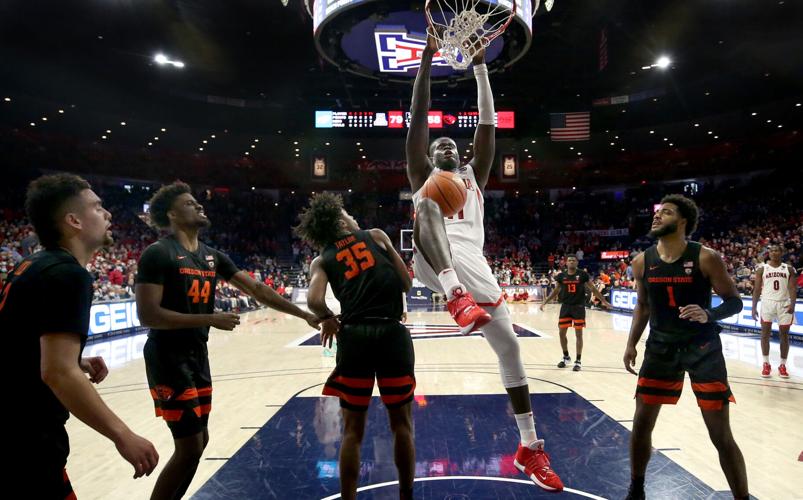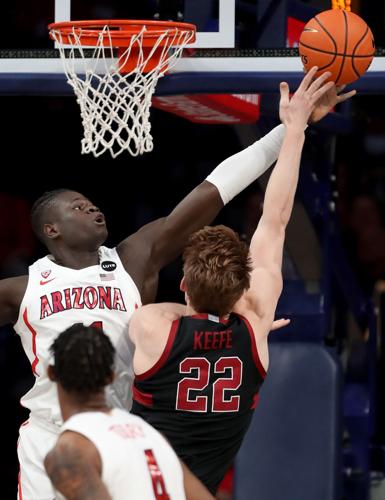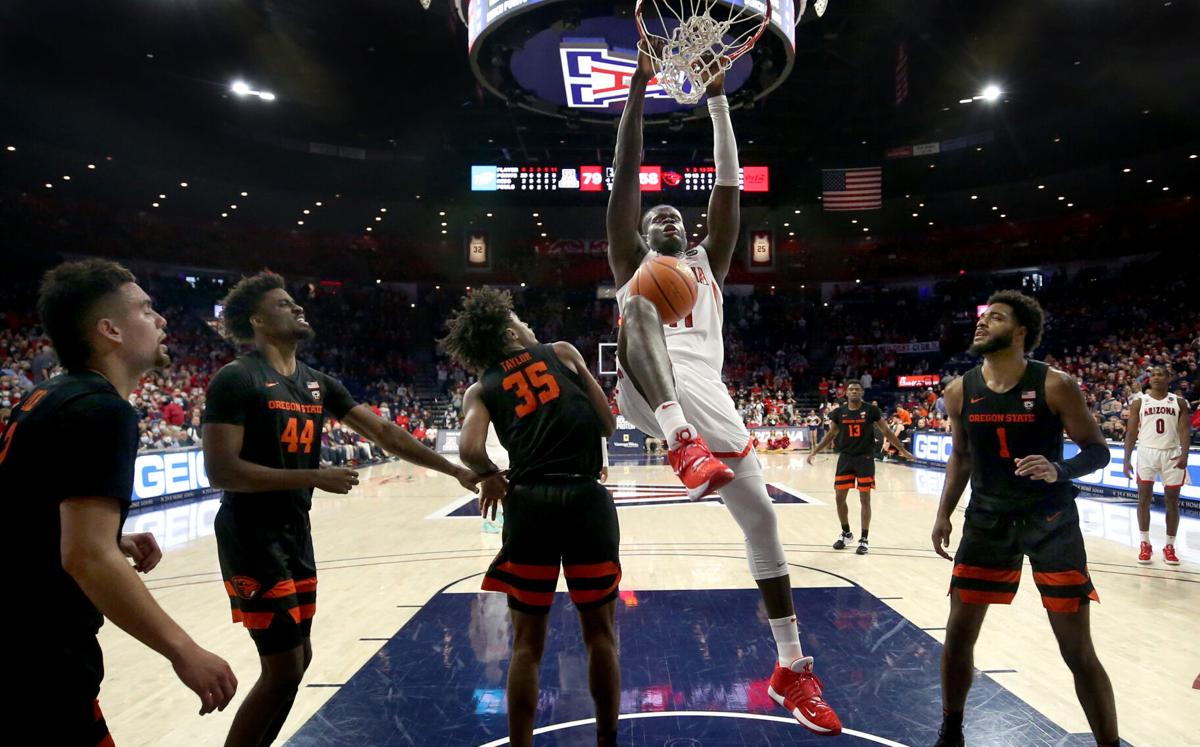Editor's note: This story appears in the Star's NCAA Tournament preview section, which you can read in its entirety by clicking here.
Oumar Ballo left home when he was 14. Try that sometime. Think you could do it?
“I always miss my mum,” he was saying Tuesday at McKale Center. “It is hard.”
Since leaving Koulikoro, Mali, to begin a life in basketball, Ballo has lived in the Canary Islands, Mexico, Spain, and in Tucson and Spokane, Washington. And he’s only a teenager.
Ballo is 19. He won’t turn 20 until July. As Arizona coach Tommy Lloyd says, “that’s mind-boggling.” Ballo didn’t fully commit to basketball until he was 13; before that, he was an unusually tall soccer goalie.
A few years ago, FC Barcelona Basquet of the EuroLeague offered Ballo a six-year basketball contract. Do you realize how impressive that is? FC Barcelona’s lineup has included two-time NBA All-Star Joe Ingles of the Utah Jazz and 12-year NBA point guard Ricky Rubio.
Ballo declined, preferring to take his chances on being discovered by American college coaches.
Lloyd, then an assistant coach at Gonzaga, made the discovery. His first contact with Ballo was at a 2016 international basketball competition in Spain. They clicked. (Who doesn’t click with Tommy Lloyd?)
“He told me about university life in the USA and said I need to pass all the classes to be eligible to play,” Ballo remembers. “It was more difficult than I thought it would be.”
Ballo redshirted his first year at Gonzaga, 2019-20, while the NCAA took longer than expected to research his international academic credits and apply them to NCAA eligibility standards.
As difficult as it has been this season to play against All-Big Ten centers 7-foot Kofi Cockburn of Illinois and 7-1 Hunter Dickinson of Michigan, it probably doesn’t compare to Ballo’s ordeal to learn and speak functional English.
“It took six to eight months to feel comfortable,” Ballo says. “I’ve come very, very far.”
How far? It takes 14 hours to fly from Ballo’s African home to Tucson, but that’s a quick trip compared to the time Ballo needed to break into Arizona’s playing rotation and become not just productive but feared.
In Arizona’s Pac-12 Tournament championship victory over UCLA last week, Ballo blocked six shots. And he only played 20 minutes.
When Lloyd examined the statistics after the UCLA game, he all but did a double-take at Ballo’s numbers. “Are you kidding me?” Lloyd said in the postgame press conference. “I mean, he’s dominating games when he’s in there. To have that many good players is a good thing, but to have that many guys that are willing to sacrifice a little bit of individual accolades for team successes, that’s what makes great teams.”
Ballo only plays 38% of Arizona’s available minutes. At almost any other school in the conference he would double that. If he is frustrated, it doesn’t show.
No one in Tucson is closer to Ballo than Pac-12 Player of the Year Bennedict Mathurin, who has witnessed Ballo’s rise from developmental player to being one of the most intimidating inside players in college basketball. Ballo and Mathurin were roommates for most of the 2018-19 season at Mexico’s NBA Academy.
“Oumar is a good person, he’s a great teammate,” Mathurin said Tuesday. “I was really happy when he came here from Gonzaga; I have a lot of great memories from playing with him in Mexico. He’s improved a lot. He’s bigger, stronger and smarter. His basketball IQ has really grown.”
Asked if he had ever seen Ballo block more than six shots in a game, as he did against UCLA, Mathurin arched his eyebrows.
“He had six blocks?” Mathurin said. “Six? I wouldn’t want to play against him.”
Ballo wasn’t game-ready when he arrived in Tucson last summer. He was about 15 pounds overweight. He had averaged just six minutes a game at Gonzaga, most of it at garbage time. The Zags didn’t seem to mind Ballo transferring. They replaced him with 7-foot prep All-American Chet Holmgren, who has been a force for the nation’s No. 1 team.
What few expected was that Ballo would become a force for the nation’s No. 2 team, for him to improve at such a steady pace that he could average 7.3 points and 4.2 rebounds per game and block 40 shots.

Oumar Ballo has blocked 40 shots in his first season with the Wildcats.
It wasn’t until midseason that Lloyd began deploying 7-foot Christian Koloko and Ballo at the same time. At first it was a minute or two here and there. Now it’s a full-blown strategy that opponents have struggled to overcome.
What happened?
“I lost weight and got in shape and got motivated to play basketball again,” says Ballo. “Practice was very difficult. Going against ‘C-Lo’ everyday forces you to work on your game and be at your best. Christian is the best defender I’ve ever played against. I’ve learned so in practice: how to score against a tough opponent, how to get and hold position.
“When you are chasing Christian up and down the court every day, you get in shape. You get better.”
Six months ago, the Oregon Ducks appeared to possess the Pac-12’s most formidable “bigs” from Cameroon and Mali. Koloko, who is from Cameroon, and Ballo, from Mali, weren’t rated anywhere near as highly as the Ducks’ 7-foot Cameroon center Franck Kepnang and Oregon’s 6-11 Mali center N’Faly Dante.
Dante and Kegnang were five-star recruits who both had offers from, among others, Kansas and Kentucky. The Ducks also added 7-foot McDonald’s All-American Nathan Bittle to what looked to be an imposing inside game.
Yet Ballo and Koloko combined to outscore Oregon’s big men 19.4 to 12.2, and outrebound them 11.3 to 9.2. Blocked shots? Koloko and Ballo had 132; the Oregon big men 73.
That’s a big part of why Oregon is in the NIT and Arizona is a No. 1 seed in the NCAA Tournament.
“I feel like I’m just getting started,” Ballo says. “Coming to Arizona with Tommy is the best decision I’ve ever made.”






